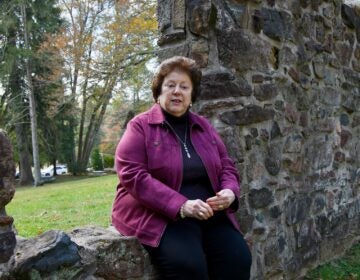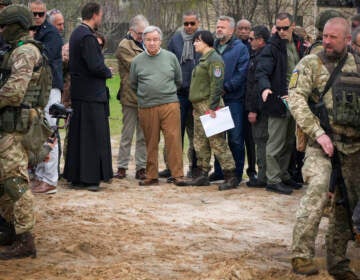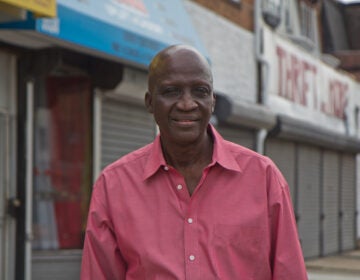Philadelphia is a flashpoint for Liberian human rights advocates
The recent federal convictions of suspected Liberian war criminals in Philadelphia is fueling the demand for a war crimes court in Liberia.
Listen 3:50
Fighters from the United Liberation Movement of Liberia (ULIMO) shoot their way through downtown Monrovia, LIberia Tuesday, April 16, 1996. (AP Photo/Jean-Marc Bouju)
The recent federal convictions of suspected Liberian war criminals Mohammed “Jungle Jabbah” Jabbateh and Jucontee Thomas Woewiyu in Philadelphia is fueling the demand for a war crimes court in Liberia.
Liberians around the world are still seeking justice for the 14-year long civil war that ended in 2003, which claimed more than 200,000 lives. Crimes such as murder, rape, conscripting child soldiers, and torture have gone unchecked by the Liberian government.
Former Liberian journalist Al-Jerome Anastas Chede is a member of the Coalition for Justice In Liberia, a justice advocacy group in the United States. He left Liberia in 1997 after allegedly being targeted by the National Patriotic Front of Liberia, the ruling regime headed by former president Charles Taylor.
He left the country in 1997 and now lives in Minnesota. Chede said survivors of the war have a responsibility to innocent people who lost their lives.
“There’s nothing wrong with crying for justice,” he said. “For any true civilization to thrive, there must be a strong foundation of justice.”
The Liberian government formed the Truth and Reconciliation Commission in the years after the civil war to identify those who committed human rights offenses and bring them to justice. The commission compiled a list of alleged war criminals, but the government hasn’t taken action.
Some of the names listed even hold political office.
“Up to now, people whose parents were killed or people who lost their loved ones are still moving around in a country traumatized, seeing the very people that were responsible for the death and destruction of their family members roaming the streets freely,” Chede said.
In the meantime, justice is found outside of Liberia, with Europe and the U.S. leading the charge in Liberian war crimes prosecutions.
The U.S. doesn’t have jurisdiction over Liberian war crimes, but immigration fraud and federal civil suits provide a pathway to justice for Liberians in America.
Both Jabbateh and Woewiyu faced long sentences for lying on their U.S. applications to hide their alleged violent past. Jabbateh, of Delaware County, was sentenced to 30 years in prison in April. Woewiyu, of Delaware County, is scheduled to be sentenced in October.
Assistant U.S. attorney Linwood Wright led the prosecution in both convictions. Philadelphia’s large Liberian population is causing speculation that there are more cases in the pipeline. Wright and his team could not comment on that, but he says his office is committed to pursuing war criminals via immigration fraud charges.
“If there are people who were involved in the conflict who have made false statements when they, in fact, were trying to gain immigration benefits and we know about it, then those are the sorts of things we’ll pursue based on the evidence.”
If immigration isn’t a feasible angle, then a civil suit is the next best option.
Moses Thomas, a Delaware County resident, allegedly oversaw the Liberian Lutheran Church massacre in 1990 where an estimated 600 people were killed. He is now being sued in federal court by victims of the massacre.
If Thomas loses the suit, the case can be used in criminal court.
There is one exception to these two approaches, however.
Charles Taylor, Jr., the son of the former president of Liberia, was convicted of torturing people in Liberia during the war using the extraterritorial torture statute. He was sentenced to 97 years in prison in 2009.
While these cases provide some retribution, long-time Liberian justice advocate Alphonso Nyenuh, who lives in Bristol, says it isn’t enough.
“That’s one of the concerns that Liberians have that this seems to be selective justice,” he said. “Real, real hardcore criminals are going scot-free simply because they haven’t migrated to the United States as we are getting other people.”
Still, the cases are adding momentum to the war crimes court movement. Two days after the conviction of Woewiyu, 76 organizations submitted a report to the United Nations Human Rights Committee. It calls out Liberia for its failure to follow through with prosecutions for war crimes.
Andrea Cayley is the U.S. country coordinator with Civitas Maxima, one of the organizations behind the submission. She said the cases in the city are having a ripple effect throughout the human rights community.
“The stuff that’s happening in Philadelphia is triggering a reaction in Liberia,” she said. “And groups of people are calling and protesting and demanding a court, which is then getting the attention of all these NGOs in Africa, Liberia, the U.S. that is then putting that together and pushing toward the U.N.”
WHYY is your source for fact-based, in-depth journalism and information. As a nonprofit organization, we rely on financial support from readers like you. Please give today.





